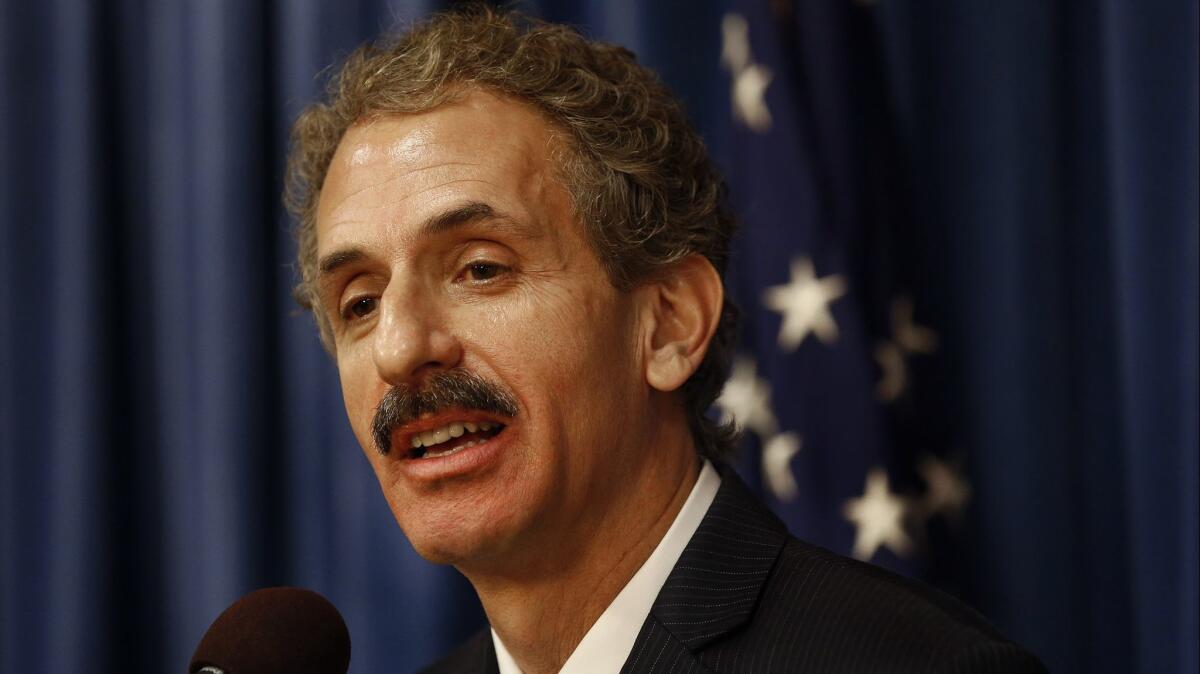Six years after overcharging fiasco, DWP’s lawyer accused of double-dealing

- Share via
The Los Angeles Department of Water and Power’s reputation hit a low six years ago when the agency’s new billing system sent out wildly inaccurate bills, overcharging hundreds of thousands of customers.
The chaos prompted widespread outrage and promises by the DWP to fix the problems and reimburse ratepayers $67 million in overcharges.
Now, the billing fiasco is sparking fresh controversy, this time centered on City Atty. Mike Feuer’s office and the role of an outside lawyer it hired to handle litigation stemming from the overcharges.
Attorney Paul Paradis worked for the city as special counsel in its lawsuit against PricewaterhouseCoopers, the consulting giant that implemented the billing system. At the same time, Paradis represented a DWP customer who would become the lead plaintiff in a class-action lawsuit against the city, according to testimony in the case.
Paradis also secured no-bid contracts from the DWP worth more than $30 million to help fix the utility’s billing problems.
PricewaterhouseCoopers alleges in court records that Paradis’ actions represent a conflict of interest and were part of a larger scheme: The firm claims that Paradis and the city worked together to select the plaintiff and the attorney who handled the class-action lawsuit over the billing snafus in an effort to get a more favorable settlement for the DWP.
“What has been exposed through discovery is a deceptive scheme of stunning scope,” PricewaterhouseCoopers attorney Daniel Thomasch wrote in a brief filed March 1 in Los Angeles Superior Court.
At a court hearing last week in the city’s ongoing lawsuit against PricewaterhouseCoopers, a judge ordered Paradis to sit for a deposition so he could be questioned under oath by the consulting firm’s lawyers.
Days later, Paradis withdrew as one of the attorneys in the city’s case against PricewaterhouseCoopers. His lawyer, David Scheper, decried what he called “false allegations” made by the consulting firm’s attorneys.
“Mr. Paradis stepped down as special counsel for the city … to dedicate time and energy in his consulting practice on cybersecurity work he’s doing for the DWP, which is critical to the city’s interests,” Scheper told The Times in an email last week.
On Tuesday, however, the DWP board voted to cancel Paradis’ $30-million consulting contract “to eliminate any potential conflict or the appearance of a conflict of interest,” the utility said in a statement.
Scheper didn’t immediately respond to messages seeking comment.
Paul Kiesel, a Beverly Hills attorney hired by the city as special counsel and working with Paradis on the PricewaterhouseCoopers lawsuit, also stepped down last week, saying he did not want to become a distraction to the litigation. He called PricewaterhouseCooper’s allegations “baseless” and an attempt to draw attention away from the city’s claims against the firm.
Feuer’s office represents the DWP in litigation related to the billing errors.
The two outside lawyers — Kiesel and Paradis — had been working under a contingency agreement that would have paid them nearly 20% of any settlement or damages award in the city’s lawsuit against PricewaterhouseCoopers.
A representative for Feuer’s office also denied the consulting firm’s allegations but said an ethics review is underway of DWP contracts and issues related to the settlement.
“I take any allegation of improper conduct by any attorney under our authority — including outside counsel — extremely seriously,” Feuer said in a statement, adding that he will take decisive action if the review finds wrongdoing.
The DWP’s billing debacle occurred as the agency was rolling out a replacement for its antiquated system in 2013. Angry customers who called the department to complain found themselves on hold for half an hour or more.
Among those overcharged was Antwon Jones, a Van Nuys resident who received a $1,374 electric bill from the utility — far more than what he had been paying for service.
On April 1, 2015, Jones filed a class-action lawsuit against the city. He was one of several ratepayers who sued over the billing errors. A settlement with Jones was announced a few months later and was blessed by a judge in 2017. It required the utility to fully compensate overcharged customers.
Around the time Jones filed his lawsuit, the city sued PricewaterhouseCoopers, accusing the consulting firm of misrepresenting its ability to implement the billing system.
It was while seeking records to defend that lawsuit that PricewaterhouseCoopers lawyers allege they caught wind of the scheme involving Paradis, whom they accuse of concealing his work for the city from his client Jones.
Jones testified in a deposition last month that he was contacted by Paradis, a New York lawyer, in December 2014 after he filed an online complaint with what he thought was a consumer website about his inflated electric bill.
“I want to start a class action lawsuit ASAP. They can’t get away with this,” he wrote in his online complaint, in which he also expressed interest in speaking with a lawyer.
Within a week of Paradis’ email reply, Jones said, he retained the attorney to represent him in potential legal proceedings against the DWP.
By January 2015, Paradis was working as a special counsel for Feuer’s office, according to his city contract. He was hired to work on possible litigation against PricewaterhouseCoopers.
PricewaterhouseCoopers attorney Thomasch alleged in his March 1 brief that city attorneys and Paradis discussed having Jones sue the firm.
The city attorney’s office confirmed in a court filing that such discussions had occurred and that top city attorneys requested the preparation of a draft complaint titled Jones vs. PricewaterhouseCoopers. But city attorneys denied there was a conflict of interest, saying that Jones had retained Paradis to represent him in a potential lawsuit against the consulting firm.
“These facts demonstrate that Mr. Jones and the city shared a common interest, namely bringing a lawsuit against PwC, to recover monies owed to both,” the filing states. “Because Mr. Jones and the city shared the desire to recover monies from the true alleged wrongdoer, Mr. Jones and the city were not at that time ‘adverse parties.’”
Los Angeles Superior Court Judge Elihu Berle, who approved the class-action ratepayer settlement and is presiding over the city’s case against PricewaterhouseCoopers, this week ordered the release of a draft Jones vs. PricewaterhouseCoopers complaint sought by the consulting firm.
Berle said he was taking the action because PricewaterhouseCoopers “has presented sufficient evidence to establish a prima facie case of fraud by the city and its counsel, fraud on Mr. Jones, possible fraud on the public, and possible fraud on the court,” according to a court transcript.
Jones, who is not accused of any wrongdoing, said in his deposition he sought out a lawyer to sue the DWP. At one point, Jones said he asked Paradis to investigate whether he had claims against PricewaterhouseCoopers, but ultimately proceeded with his plan to sue only the city.
He also said that he was never informed that Paradis worked for the city.
In late March 2015, Paradis sent an email to Jones, introducing him to Jack Landskroner, an Ohio consumer rights attorney.
Landskroner filed Jones vs. City of Los Angeles less than a week later. But Paradis never formally withdrew as his lawyer, Jones said, testifying that he thought both Landskroner and Paradis were his attorneys up through the lawsuit’s final settlement in July 2017.
Paradis’ attorney Scheper didn’t respond to a Times’ email asking for the time period that Paradis represented Jones.
Paradis participated in mediations in the Jones lawsuit, according to a city attorney’s spokesman, who told The Times that Paradis was there to “provide the city’s attorneys with technical input” on the billing system.
PricewaterhouseCoopers contends that Landskroner and the city’s special counsels, Paradis and Kiesel, worked together to clear the way for a settlement that was reached without a full public airing of the issues.
At the time the settlement was announced, consumer advocates criticized the agreement for giving the DWP too much influence over deciding how much customers had been overcharged and how to fix the billing problems.
The DWP, required under the settlement to improve its billing system, gave one of Paradis’ companies, Aventador Utility Solutions, a no-bid, $30-million contract in 2017 to do remediation work. His company was paid more than $20 million before the DWP board voted Tuesday to cancel the agreement, a DWP spokesman said.
Paradis’ law firm had previously secured a similar contract with the utility worth about $6 million.
For his part, Landskroner reaped a huge payday from attorney fees in the case.
“Landskroner, without taking or defending a single deposition, garnered the majority of $19 million in total fees divided among counsel — a significant portion of which appears attributable to work apparently performed before he was even introduced to Jones, ” Thomasch wrote in his March 1 brief.
At a hearing last week, Berle asked Landskroner if any referral fees had been paid to Paradis. Landskroner deferred to his lawyer, Mark Drooks, who cited his client’s 5th Amendment protections against self-incrimination and declined to answer the judge’s question.
Referral fees are common in California, allowing lawyers to receive a portion of fees earned in a case that they passed on to other attorneys to handle the work.
In his email to The Times, Paradis’ lawyer, Scheper, denied that his client got any of the fees from the Jones case.
Landskroner declined to comment through his attorney.
At the hearing, a visibly agitated Berle ordered the city to stop all payments to Paradis and Landskroner. He set another hearing to determine whether an independent audit is needed.
Berle also directed both attorneys to be deposed by PricewaterhouseCoopers.
“Everybody understood that Mr. Paradis was the hub,” Thomasch told the court. “Every spoke comes into him, and it has been that way from the fall of 2014 to today.”
UPDATES:
March 16, 2019: This article was updated to include Los Angeles Superior Court Judge Elihu Berle’s ruling on the release of a draft court complaint and his comments at that hearing.
More to Read
Sign up for Essential California
The most important California stories and recommendations in your inbox every morning.
You may occasionally receive promotional content from the Los Angeles Times.












